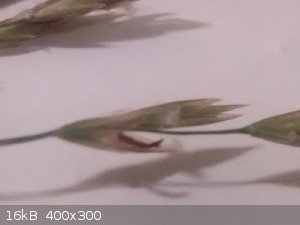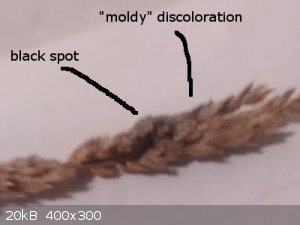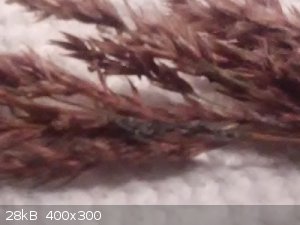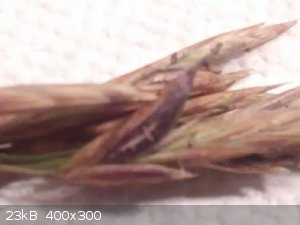| Pages:
1
2 |
JJay
International Hazard
    
Posts: 3440
Registered: 15-10-2015
Member Is Offline
|
|
Some fungus growing on grass
I have been studying various species of wild grass for the past few weeks after I noticed some odd growths on their seed heads. At first I wasn't sure
if they were some sort of pollinator or a fungus, but over time I saw more and more of them. Some were red, some black, purple, white, green, yellow.
It has been raining the past few days, and the growths on the grass have grown much larger and more plentiful. I see them on many species of grass,
and though the colors vary widely, from white to green to black to purple, and the level of infestation varies from just a few growths to the
colonization of almost the entire seedhead, the shape of the growths is fairly uniform no matter what kind of grass they are growing on. The growths
are long and skinny and do not resemble the ergot that I have seen in photos.
So far I have left all of the suspected fungus in its natural habitat, but I am wondering: Are these growths actually ergot? What other kinds of
fungus grow on grass seedheads? If they are ergot, is it safe/legal to do anything with them except take pictures?
|
|
|
MJ101
Hazard to Self
 
Posts: 82
Registered: 14-6-2018
Member Is Offline
Mood: Always Sunny
|
|
@JJay: Please post pictures. Maybe someone can identify them for you.
Here's something I found on ergot fungus. They have a picture of ergot on a wheat stalk.
https://www.britannica.com/science/ergot-fungus
I hope this helps. 
|
|
|
JJay
International Hazard
    
Posts: 3440
Registered: 15-10-2015
Member Is Offline
|
|
The growths do not look like those at all... I think maybe the growths are just anthers. I'll try to get some pictures.
|
|
|
S.C. Wack
bibliomaster
    
Posts: 2419
Registered: 7-5-2004
Location: Cornworld, Central USA
Member Is Offline
Mood: Enhanced
|
|
If it looks like mini-ergot it probably is. Technically if your intent is extraction and lysergic acid that's OK unless it's to be converted to
something interesting. Don't eat bread made from the grass seed.
|
|
|
JJay
International Hazard
    
Posts: 3440
Registered: 15-10-2015
Member Is Offline
|
|
Well, I am pretty sure I found a very tiny ergot today. It was on a very short common lawn grass (a Festuca I believe) that has black seeds. Its seed
heads often look like they have mildew or something growing on them, and the seed stalks are not very tall, so they are easy to overlook.
I believe that this particular Festuca colonizes entire lawns, but the seed heads are typically visible only on the edges of lawns and other places
that are hard to mow. I saw a few that looked like they might have ergot growing on them, but on one specimen about a block from my home on the
sidewalk's edge, I saw a very tiny ergot-looking growth protruding out of one of the seed pods. I removed the seed from its pod and looked at it to
make sure that I wasn't just seeing a seed protruding from its pod, and there was definitely a black growth with its base in a seed. I didn't keep it,
mainly because I had nothing to put it in. If it was really ergot, I think I will find some more.
I have checked several varieties of wild rye but haven't seen any ergots.
It might be fun to try to grow some ergot and see if it is possible to get any ergot alkaloids out of it. I think probably the best way would be to
start it on agar with suitable nutrients and use a healthy culture to inoculate some kind of fermenter.
I thought I had read somewhere that isolating lysergic acid is illegal because it is a controlled substance as well as a listed substance, but I will
have to look into it to have peace of mind. I think ergot alkaloids are uncontrolled, though... I will definitely research the laws on them thoroughly
before gathering any ergot.
Hopefully, I can get some decent pictures the next few days....
[Edited on 25-7-2018 by JJay]
|
|
|
clearly_not_atara
International Hazard
    
Posts: 2787
Registered: 3-11-2013
Member Is Online
Mood: Big
|
|
Lysergic acid is a Schedule III compound:
https://en.wikipedia.org/wiki/List_of_Schedule_III_drugs_(US)#Hallucinogens
However, ergotamine itself is only listed, IIRC.
|
|
|
CouchHatter
Hazard to Others
  
Posts: 152
Registered: 28-10-2017
Location: Oklahoma
Member Is Offline
Mood: 76 elements taken!
|
|
Ergonovine and ergotamine are List I, at 10g and 20g respectively. Page 34.
The thing to research would be threshold possession of controlled substances - your state might have different laws.
[Edited on 27-7-2018 by CouchHatter]
|
|
|
JJay
International Hazard
    
Posts: 3440
Registered: 15-10-2015
Member Is Offline
|
|
I didn't see any well-formed ergots today, but I did see a lot more diseased grass than I did the other day... fingers crossed for the next rain....
|
|
|
JJay
International Hazard
    
Posts: 3440
Registered: 15-10-2015
Member Is Offline
|
|
I went looking today and still didn't find any well-formed ergots, but I took some pictures.
This sort of growth is what caught my attention initially. I no longer believe that growths of this sort are ergot; instead, I think they are anthers:

This I believe might be ergot. It's hard to get a decent picture of it, but I am almost 100% positive that it is some sort of fungus. I found a
better-formed specimen last week on this same variety of grass, but it was very tiny.

Any ideas how I could conclusively identify the fungus on the second specimen? I was thinking I might use microscopy, but the local libraries have a
positively dismal selection of journals, so I'm not sure what references to use....
|
|
|
Tsjerk
International Hazard
    
Posts: 3032
Registered: 20-4-2005
Location: Netherlands
Member Is Offline
Mood: Mood
|
|
You probably need more than one infected top, actually quite a lot, but you could test with Marquis reagent. I expect the test to become black with
ergot, but I can't find conclusive examples.
|
|
|
JJay
International Hazard
    
Posts: 3440
Registered: 15-10-2015
Member Is Offline
|
|
Quote: Originally posted by Tsjerk  | | You probably need more than one infected top, actually quite a lot, but you could test with Marquis reagent. I expect the test to become black with
ergot, but I can't find conclusive examples. |
That is a good idea, and I think there are some more exotic reagents that are used specifically for ergolines. Given that the alkaloid concentration
is probably very low, I think it will be necessary to grow cultures first to perform a positive identification.
I already have agar on my shopping list, but according to everyone's favorite encyclopedia, they usually use agar fortified with dextrose and potatoes
for ergot, sterilized at 15 PSIG (which is about what a pressure cooker does). I don't have any petri dishes, but I imagine that baby food jars would
work.
A terrarium should be sufficient for developing cultures on agar, but I'd need a clean room or a glove box for inoculating them, and I'm not sure a
HEPA filter is going to cut it... I know a neighbor who has a bio lab, but I'm not sure if he'd like this project.
|
|
|
Tsjerk
International Hazard
    
Posts: 3032
Registered: 20-4-2005
Location: Netherlands
Member Is Offline
Mood: Mood
|
|
Cool! More people doing microbiology!
When starting I would just use a camping gas stove burner instead of directly working with a glovebox or HEPA filters. If you never did sterile
working I would try isolating some species from air or dust or something and see if you can propagate them.
|
|
|
JJay
International Hazard
    
Posts: 3440
Registered: 15-10-2015
Member Is Offline
|
|
This has some kind of black growth that I've seen a few places. It looks almost like motor oil on grass. On this one, I can also see a couple of tiny
growths that look like ergots where there should be florets.

|
|
|
JJay
International Hazard
    
Posts: 3440
Registered: 15-10-2015
Member Is Offline
|
|
Jackpot.

|
|
|
happyfooddance
National Hazard
   
Posts: 530
Registered: 9-11-2017
Location: Los Angeles, Ca.
Member Is Offline
Mood: No Mood
|
|
Quote: Originally posted by JJay  |
A terrarium should be sufficient for developing cultures on agar, but I'd need a clean room or a glove box for inoculating them, and I'm not sure a
HEPA filter is going to cut it... I know a neighbor who has a bio lab, but I'm not sure if he'd like this project. |
If you have a room (bathroom maybe) that is not carpeted and has mostly non-porous surfaces, DOESN'T have a draft, which you can easily clear out
(clear counters, shelves, etc), it isn't too hard to sterilize with Lysol or Oust. Buy a couple of cans. Also you will need a flame and some 50%ish
alcohol. I am sure you have read up on the basics, but it isn't too hard to make it happen in a home setting. I used to grow mushrooms (lentinula
edodes "shiitake", pleurotus ostreatus "oyster", agaricus brunescens "crimini/portabella/button" and others) at home, and I would inoculate them at
home, with a very low contamination rate (less than 2%, easily). I used to even make my own spore syringes and liquid cultures.
Just to say it can be done. Wipe down the walls (and ceiling if you can), then the floor, then spray everything down with the Lysol, then bring in
your equipment and place it on a table or counter, preferably a tall one, because 90% of contaminants hang out within 3 ft of the ground. Then spray
all that down, then go fix yourself (shower, fresh clothes). I wear long sleeves and spray myself down with the Lysol.
It might sound like a lot of work, but you could set up in half an hour if you do it right.
|
|
|
JJay
International Hazard
    
Posts: 3440
Registered: 15-10-2015
Member Is Offline
|
|
There are some photos of fruiting ergot on some of the mushroom forums.
Right now I have the four specimens sitting in plastic bags in my refrigerator. If I can find any dextrose, I'm going to try growing each on agar
while I research chemical reagents that can identify ergot alkaloids, but I'm not too sure about going any further.
In a way, it would be kind of cool to isolate some ergotamine, but I'm a bit doubtful that I could get my bathroom clean enough for inoculating a
fermenter... I guess something like a temperature-controlled five-gallon bucket with a filtered aquarium bubbler would work, but the conditions would
have to be ultra-clean, and I have too many other projects going on.
I wonder how hard it is to get a license to sell ergotamine....
|
|
|
Tsjerk
International Hazard
    
Posts: 3032
Registered: 20-4-2005
Location: Netherlands
Member Is Offline
Mood: Mood
|
|
You can always consider the use of antibiotics against contaminations. It makes working "sterile" a whole lot easier.
|
|
|
happyfooddance
National Hazard
   
Posts: 530
Registered: 9-11-2017
Location: Los Angeles, Ca.
Member Is Offline
Mood: No Mood
|
|
Quote: Originally posted by Tsjerk  | | You can always consider the use of antibiotics against contaminations. It makes working "sterile" a whole lot easier. |
This is a really great suggestion for preventing some tenacious bacteria like clostridium, whose endospores can survive sterilization (although there
are ways to destroy the endospores if you are in the know). However, it won't do any good against fungi like trichoderma, which love a dextrose medium
and are ubiquitous.
Quote: Originally posted by JJay  | If I can find any dextrose, I'm going to try growing each on agar while I research chemical reagents that can identify ergot alkaloids, but I'm not
too sure about going any further.
|
Splenda sweetener is mostly dextrose (and maltodextrin). The small amount of sucralose shouldn't interfere, but can be easily removed with dry
alcohol. I used splenda packets that I got for free to make the aforementioned liquid cultures.
Quote: Originally posted by JJay  | I'm a bit doubtful that I could get my bathroom clean enough for inoculating a fermenter... I guess something like a temperature-controlled
five-gallon bucket with a filtered aquarium bubbler would work, but the conditions would have to be ultra-clean, and I have too many other projects
going on.
|
Getting a bathroom clean enough for inoculation is easy. I already told you how to do it. Trust me: nothing is going to live coated in Lysol.
As to the five-gallon bucket, how would you go about sterilizing it? Unless you have a 20-gallon pressure cooker I guess...
Think a little smaller, maybe quart canning jars? As a chemist you should know, scaling up before trying out your method is a great way to waste your
time, energy, and resources.
An aquarium bubbler with an inline hepa filter sounds like it would work, but probably won't: the filters have a shelf life and the volume of air you
would be pushing, plus the airlock with H2O2 (which will need to be replaced often, while maintaining the integrity of the seal - good luck with that)
sounds like a major pain in the ass.
Better would be canning jars with holes in the lid, with Tyvek under the lid. That would give you enough air flow, plus you can put the whole shebang
(including your medium) in a pressure cooker.
Tyvek can be gotten for free, FedEx, UPS, USPS all have free envelopes made of Tyvek.
[Edited on 8-5-2018 by happyfooddance]
[Edited on 8-5-2018 by happyfooddance]
|
|
|
JJay
International Hazard
    
Posts: 3440
Registered: 15-10-2015
Member Is Offline
|
|
I went for a walk earlier and saw more well-formed ergots. They seem to be most plentiful along roads with heavy traffic (I'm guessing that has
something to do with how the spores spread).
A 5-gallon bucket filled with potato dextrose broth is not exactly a huge investment....
I never even thought of using an airlock filled with H2O2... I figured a tube filled with cotton would be sufficient as long as the cotton stays dry.
The volume of air would be tiny... I've never done anything like that before, but I'm pretty sure that the biggest problem would be keeping out
contamination when inoculating the medium.
|
|
|
happyfooddance
National Hazard
   
Posts: 530
Registered: 9-11-2017
Location: Los Angeles, Ca.
Member Is Offline
Mood: No Mood
|
|
Quote: Originally posted by JJay  | I've never done anything like that before, but I'm pretty sure that the biggest problem would be keeping out contamination when inoculating the
medium.
|
Sorry to say, but you're pretty wrong about that. That is literally the easiest part!
For example, transfering your sterile medium (not to mention sterilizing that quantity) into your "sterile" 5 gallon bucket is a vastly more difficult
operation, with much, much more opportunity for contamination to be introduced. And keeping that sterile is going to be pretty close to impossible.
Innoculating anything is extremely simple, just flame a syringe until its red, lift lid, squirt, shut lid, done. If this is done in a mist of Lysol it
is near foolproof. I've done it more times than I can count.
But, you learn from experience, so I guess try what you think will work.
|
|
|
JJay
International Hazard
    
Posts: 3440
Registered: 15-10-2015
Member Is Offline
|
|
You're missing the point, happyfooddance. The process of transferring the medium into the 5-gallon bucket is part of the whole process of inoculating
the medium. The point is, once you have the medium inoculated, it's going to be pretty easy to keep stuff out. While there are lots of mushroom teks
on inoculating from agar, there is a serious risk of contamination when doing so, especially in a filthy place like your bathroom, and they suggest
using special flow hoods (which is where the HEPA filter comes into play).
|
|
|
happyfooddance
National Hazard
   
Posts: 530
Registered: 9-11-2017
Location: Los Angeles, Ca.
Member Is Offline
Mood: No Mood
|
|
Quote: Originally posted by JJay  | You're telling me that you can load agar and mycelium into a syringe? You really think you can squeeze agar through a hypodermic needle? I don't care
how many times you claim to have grown random species of mushrooms in your bathroom at home; this is nothing like that. You are not an expert.
The process of transferring the medium into the 5 gallon bucket is part of the whole process of inoculating the medium. The point is, once you have
the medium inoculated, it's going to be pretty easy to keep stuff out.
|
Lol. Don't get mad just because you don't know what I'm talking about. Maybe just read more about things such as isolating cultures and streaking
petris. It's all pretty simple stuff. I may not be an expert but I am certainly experienced.
No you don't put agar in the syringe, that is ridiculous, I never said anything about that. What I have done is take a small sample of mycelium
growing, or a spore print, and place them in sterile syringes with a couple small bearings (sterilize them with the bearings inside). You don't use
hypodermic needles, why? Because hypodermic needles are for injecting into human veins. You use luer locks of the proper gauge, I got mine in a few
gauges from a livestock supply store. Horse syringes. You fill the syringe with sterile water. You shake it well to diperse the cells a bit, and use
it to inoculate your medium. Agar is used to ISOLATE the culture.
I didn't grow "random" mushrooms, I grew very specific ones (I told you some), and very little else in the way of contamination, though I have dealt
with frustrating contamination (namely, CLOSTRIDIUM). Like I mentioned, trichoderma is also one that likes to sneak in. You say that it is nothing
like this, but that is ignorant to the fact that you will be trying to stave off the same contaminants, because the same contaminants are everywhere
on the planet and thrive/die in the same conditions. And I have isolated cultures and inoculated them onto the same media that you propose to use.
I never inoculated in my bathroom, that was just a suggestion I made for YOU, as they usually have non-porous surfaces. I usually work in the kitchen.
I don't "claim" to have done any of this because I give a shit about what you think, I just thought I could help. In the spirit of ScienceMadness.
|
|
|
JJay
International Hazard
    
Posts: 3440
Registered: 15-10-2015
Member Is Offline
|
|
I am well aware of how big of a problem trichoderma is. Again, your experience growing random mushrooms in various potentially unsanitary conditions
is not really applicable, and stating that I'm ignorant to blahblah when I'm talking about filters and flow hoods while you're working in your kitchen
- seriously man, you must be on drugs or something.
|
|
|
happyfooddance
National Hazard
   
Posts: 530
Registered: 9-11-2017
Location: Los Angeles, Ca.
Member Is Offline
Mood: No Mood
|
|
Bro. You are talking about making ergotamine.
No it's not legal, and it is impossible for you to get a license.
It is okay, I won't post in your thread, good luck 
|
|
|
JJay
International Hazard
    
Posts: 3440
Registered: 15-10-2015
Member Is Offline
|
|
Look, please stop spouting off on things you have no knowledge of as if you are an authority. You mentioned that Splenda is mostly dextrose, cool.
That is your only contribution to this thread. There's no legal barrier to me for getting a DEA license with a legitimate reason, and it's perfectly
legal to make ergotamine without a license (under the threshold quantity, which IIRC is 20 grams).
Am I going to do that? Probably not, but it's something to think about.
|
|
|
| Pages:
1
2 |